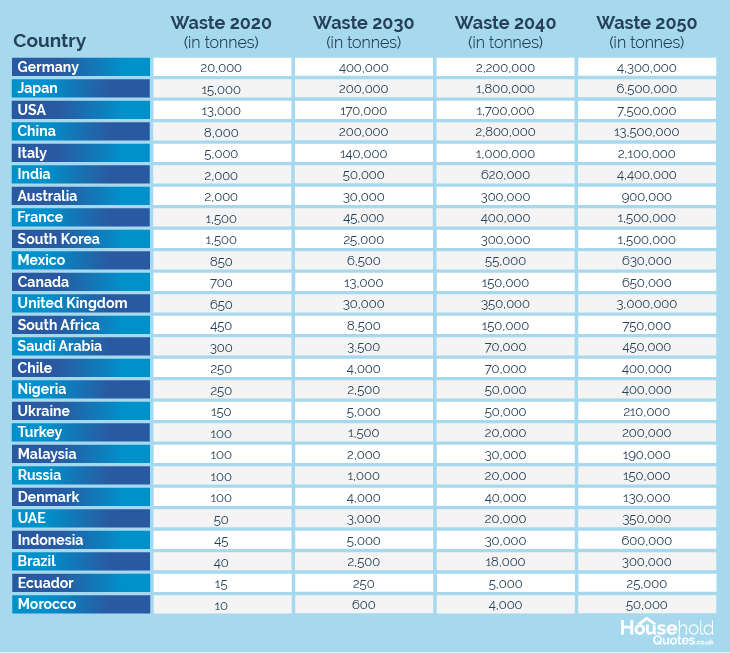- Householdquotes.co.uk
- Blog
- Solar Panel Recycling: 2024 Guide
Process and Benefits of Solar Panel Recycling


According to the government website, the final quarter of 2023 saw 51.5% of the UK’s energy being produced by renewable sources. These include; wind power, bioenergy, hydroelectric and solar energy.
Solar energy is where energy from the sun is converted into power, this is done via solar panels that sit outside absorbing the warmth of the sunlight. The panels are made up of electrically connected solar cells which are enclosed in a glass frame. Having one on the roof of your home can drastically reduce your energy bill.
There comes a time when a solar panel is past its expiry date and needs to be replaced and disposed of. We know solar energy providers pride themselves on their sustainability and conscious effort to be eco-friendly. So let’s investigate what happens to a solar panel when it reaches the end of its lifespan.
What happens when a solar panel needs to be disposed of?
Statistica reports that silicon-based solar panels make up around 70% of the global solar market. Thin-film is the second biggest contributor with just over 11% of the solar panel market being made up of this material.
Because of this, the way a solar panel is disposed of can differ, so we’ll go into both.
Silicon-based solar panel recycling
When it comes to recycling, the first step in the process is to separate the materials. In this case, it’s the aluminium frame and the glass casing. Of this, 95% of glass is reused along with 100% of the aluminium. This makes it a very sustainable product, as the amount of material you lose is very small.
The next step is to evaporate small plastic components and physically separate cell modules. Around 80% of cell modules are reused. This is done by thermal processing, which increases the temperature north of 500 degrees Celsius.
Now it’s time to remould the silicon into reusable slabs, 85% of which is used to create new solar panels, and 15% is lost.
Thin-film solar panel recycling
Thin-panel recycling is a more complicated process. Solar panels are put into a shredder before a hammermill so each panel can be reduced to about 5 mm pieces. This breaks the lamination keeping the materials together.
You should be left with a mix of liquid and solid materials, this is then separated by a rotating screw. Next, the semiconductor material needs to be separated from the glass, this is done using peroxide and acid.
Of the materials separated, around 90% of glass is reused along with 95% of semiconductor material.

What is the lifespan of a solar panel?
Solar panel installation is an expensive investment, with the cost to install to your home costing between £5000-£13,000 on average. So to make the most out of your investment, it’s vital that the panels have a good lifespan.
The average life expectancy of a solar panel is between 25 to 30 years. This depends on several factors including; the environment they’re in, how well they are maintained and how much they are used.
Power efficiency may decrease as a solar panel ages, after 10-15 years it will decrease by 10%, and by 25 years, 20%. High-quality solar panels are known to only lose 5-8% of efficiency over 25 years, meaning they can live for longer. There are examples of these panels having a lifespan of over 40 years, increasing the return on investment.
Waste by country
As countries expand their solar panel empire, we’ll see an increase in solar waste. This will require huge investment into the waste management industry to deal with the ever growing demand.
Below shows the solar waste generated by different countries in 2020, it then reveals the estimated waste in 2030, 2040 and 2050.

Germany, Japan and the USA are currently the three front runners at producing the most solar waste. This is expected to change by 2050, with China overlapping all three, the United States moving to second and Japan dropping to third.
Benefits of solar panel recycling
- Employment: Due to the multiple processes that go into recycling solar panels, it has turned into a lucrative business. It’s predicted by 2050, they’ll be £50 billion in recoverable value. Experts will be required, who have experience in separating materials and using heavy machinery. These jobs can be very well-paid which is great for the industry.
- Eco-friendly: Solar panel recycling is generally very eco-friendly. Silicon-based solar panels are better for the environment than thin-film-based, this is because thin-film uses cadmium which is a toxic material.
- Saves rare materials: Gallium and indium are key components that make up a solar panel. These materials are rapidly being exhausted, so saving them is a more sustainable approach to ensure we can keep creating new solar panels.
How to dispose of solar panels
When you get to the point where your solar panel has reached the end of its life, don’t be tempted to send it to a landfill. The recycling of solar panels is completely free in the UK, it is required by law for manufacturers to dispose of them.
Contact the manufacturer and let them know that you want the solar panel to be picked up, then they will do the rest. Don’t worry about any remnants being left behind, the whole panel will be removed including the mounting system.
This process comes at no cost to you, so don’t be put off by thinking it will be a damaging decision for your pocket.
The future of solar waste management
The solar panel waste disposal industry is only set to get bigger. As solar panel installation becomes more and more affordable for the average person, there’ll need to be a big investment in the infrastructure of waste management. We could be in a position in a few decades where solar panels become the societal norm, hence the massive increase in employment and profitability.
Good waste management infrastructure will make the solar panel industry very self-sufficient. A lot of materials required for new panels could be saved from old ones, with only a small percentage of new material being required.

Josh Houston is a writer at Household Quotes whose passionate about the world of renewable energy, energy saving solutions and home improvements. He specialises in providing useful tips that our readers can adopt for their own needs. His skills involve translating complex topics to something more understandable.
